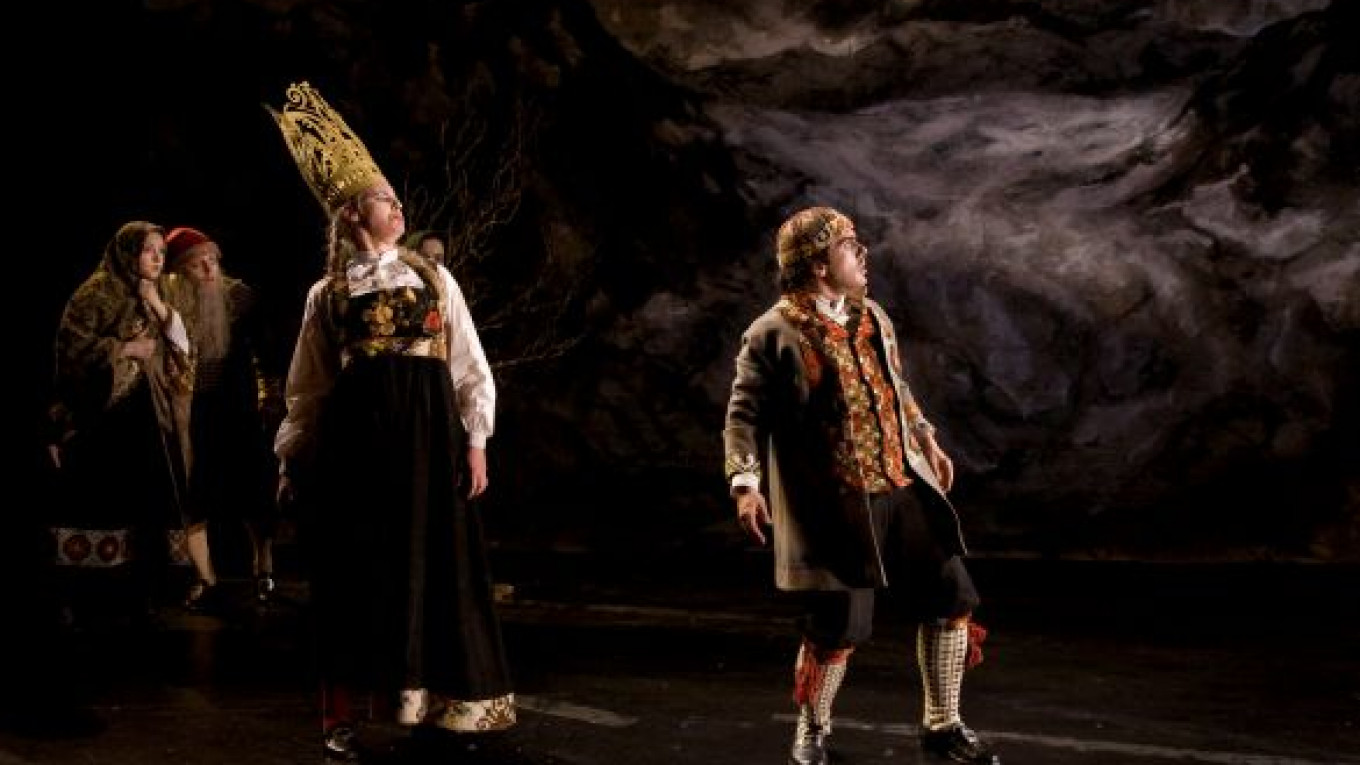As theaters throughout Moscow begin new Fall seasons, the Territoria theater festival begins its eighth year of bringing young thespians from the provinces to stages in the capital. This festival of youth and amateur theater will last from Oct. 1 to 8 and will include plays and workshops put together by international theater experts and theater students from around Russia.
"It is an interesting collection of very different artistic sensibilities. … One can find Indian dancers side by side with Belgian choreographers," Territoria art director Roman Dolzhansky said in a press conference last week. "In each show, we can find different genres, different cultures and different artists."
Territoria, which describes itself as a "theatrical festival-school," started out as a unique project to bring together theater students from all over Russia with some of the best-known theatrical directors and technicians from abroad. The theater has gradually increased its scope, and in its eighth year it will include experts from Germany, Norway, Belgium, Greece and Russia, incorporating foreign directors like Declan Donnellan from Ireland and Lars Øyno from Norway as well as up-and-coming Russian directors like Kirill Serebrennikov and Timofei Klubyanin.
"The festival does not let people be indifferent. These are works that make you think, that change your consciousness," Serebrennikov said. These theater experts will work with a group of about 150 theater students from all over Russia to present nine different plays on a variety of stages throughout the city.
The main platform of the festival will the the Theater of Nations, while smaller projects will be carried out at Gogol Center, Platforma, the Moscow Museum of Modern Art, the Moskvich Cultural Center, the Central Museum of the Armed Forces and the M.N. Yermolova House Museum.
At the Theater of Nations, some of the festival's most anticipated projects will be performed, such as Klubyanin's reworking of the classic Greek tale of Elektra, the daughter of Agamemnon, first staged by Euripides. Klubyanin said he aimed for a more psychological version of the myth, perhaps intending to give the theme of matricide more serious consideration than in Euripides' original, which ends with the mildly unsatisfying intervention of Castor and Polydeuces.
Also expected at the Theater of Nations is "Rausch," a new work presented by German playwright Falk Richter with choreography by Anouk van Dijk, which will deal with the theme of "loss of control" through dance and music. Norwegian Lars Øyno will present "Mountain Bird" by Henrik Ibsen, while director Dmitry Volkostrelov will transform Pavel Pryazhko's text "Three Days in Hell" into an experience that will encompass the audience and force them to interpret events that happen all around them, yet which they cannot see.
Outside of the main stage, there are plenty of other projects worth looking at. At Gogol Center, Kirill Serebrennikov will stage a musical version of Frank Wedekind's "Spring Awakening," a play concerning puberty and sexual awakening in youth that created a furor when first staged in 1906.
"Inside the Black Square" an installation and theatrical piece presenting the history of an urban space from 1812 to the present, will be presented at the Moscow Museum of Modern Art on Petrovka inside the exhibit "Sny Dlya Tekh Kto Bodrstvuyet." Another nontraditional performance, the project "Living Spaces" will present a number of short, rough sketches developed by young actors in a short time frame. The project will be carried out in unusual performance spaces provided by three different museums, the M. N. Yermolova House Museum, The Central Museum of the Armed Forces and the Moscow Museum of Modern Art on Petrovka.
Apart from the theatrical productions, the festival will contain numerous workshops and lectures for participants and aims to encourage students to take what they learn back to their own cities and spread theater throughout the provinces.
"The first Territoria festival in 2006 … was received as something out of the ordinary, something new to Moscow, and it was hotly discussed," said Sofia Apfelbaum, a representative of the Russian Culture Ministry. "Now, there are already similar festivals that happen in the regions, and we are trying to create a network of these events."
This year, the festival seems to have a play for everyone, and all Muscovites are encouraged to make it to at least one performance.
The Territoria festival will take place from Oct. 1 to 8. For more information on performances, times and locations, check the Territoria website at territoryfest.ru
Contact the author at g.golubock@imedia.ru
A Message from The Moscow Times:
Dear readers,
We are facing unprecedented challenges. Russia's Prosecutor General's Office has designated The Moscow Times as an "undesirable" organization, criminalizing our work and putting our staff at risk of prosecution. This follows our earlier unjust labeling as a "foreign agent."
These actions are direct attempts to silence independent journalism in Russia. The authorities claim our work "discredits the decisions of the Russian leadership." We see things differently: we strive to provide accurate, unbiased reporting on Russia.
We, the journalists of The Moscow Times, refuse to be silenced. But to continue our work, we need your help.
Your support, no matter how small, makes a world of difference. If you can, please support us monthly starting from just $2. It's quick to set up, and every contribution makes a significant impact.
By supporting The Moscow Times, you're defending open, independent journalism in the face of repression. Thank you for standing with us.
Remind me later.






